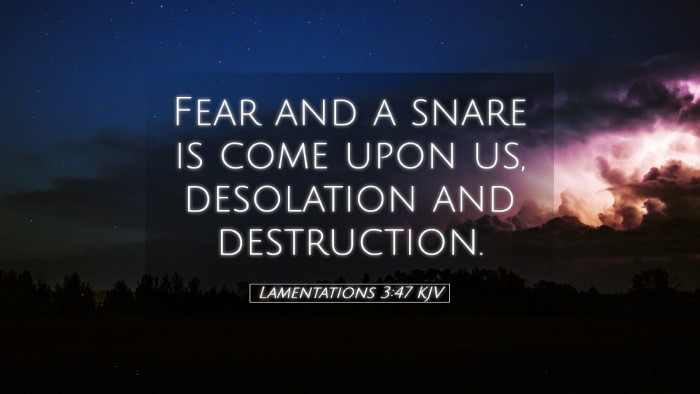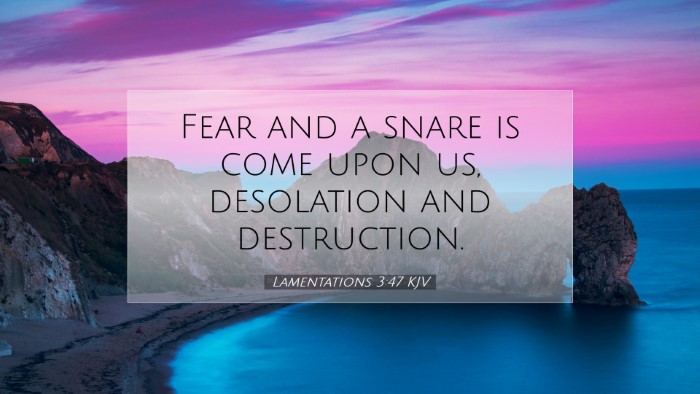Lamentations 3:47 Commentary
Verse: "Fear and a snare is come upon us, desolation and destruction."
Overview of Lamentations
The book of Lamentations, attributed traditionally to the prophet Jeremiah, serves as a poignant expression of grief and sorrow over the destruction of Jerusalem. It presents a profound meditation on suffering, the consequences of sin, and the enduring faithfulness of God amidst calamity. Within this framework, Lamentations 3 offers a particularly deep reflection on hope interwoven with affliction.
Contextual Analysis
Lamentations 3 stands out as a segment offering a personal lament amidst the collective sorrow of the nation. Verse 47 encapsulates the theme of fear and anguish, highlighting emotional and spiritual strain experienced by the people following their exile and loss of their homeland.
Commentary Insights
Matthew Henry's Commentary
Matthew Henry notes that this verse articulates the overwhelming sense of dread that enveloped the children of Israel in their time of distress. He observes:
- “Fear accompanies the judgment of God, replacing peace and security.”
- “The ‘snare’ suggests that they found themselves entrapped in a situation that they could not escape, reflecting their powerlessness.”
- “Desolation and destruction were not merely physical realities but also spiritual and emotional states indicative of abandonment.”
For Henry, the fear mentioned points not only to immediate afflictions but also to a profound existential dread regarding God's withdrawal from His people.
Albert Barnes' Commentary
Albert Barnes focuses on the implications of fear and the imagery portrayed in this verse. He elaborates on the following points:
- “Fear arises when one realizes the reality of God’s judgment; it is a direct result of the recognition of sin.”
- “The terms ‘desolation and destruction’ serve to illustrate the totality of loss experienced by the people.”
- “The verse symbolizes not just physical ruin but the complete disruption of societal and religious life.”
Barnes emphasizes that the feelings expressed in this verse provide a lens through which one might understand the internal turmoil accompanying external devastation.
Adam Clarke's Commentary
Adam Clarke delves into the theological dimensions of the verse, offering a detailed exploration of the language used:
- “The construct of ‘fear and a snare’ serves to reflect a state of alertness and anxiety, indicating deep spiritual struggle.”
- “Clarke points out that destruction was both a prophetic declaration and a lived reality, embodying the covenant consequences of Israel's disobedience.”
- “He relates the imagery to the broader biblical narrative, where God’s people often found themselves ensnared by their iniquities.”
Clarke’s insights lead to a reflection on the nature of sin’s bondage and the hope of redemption that might arise from acknowledgment of such despair.
Theological Implications
The verse illustrates the theological theme of divine judgment in response to collective sin. Each commentator emphasizes the necessity of recognizing sin as the root of fear and despair:
- Fear as a consequence of sin: The feelings described stem directly from Israel's abandonment of God and their covenant responsibilities.
- The snare of calamity: This metaphor not only denotes physical entrapment but signals the spiritual bondage that sin produces.
- Hope amid despair: While the current state is grim, the framework of Lamentations ultimately points to the possibility of restoration and hope in God’s mercy.
Practical Applications
The implications of Lamentations 3:47 resonate deeply for contemporary readers:
- The reality of fear: Recognizing that fear can often point to deeper spiritual issues, prompting self-examination and repentance.
- Understanding sin's consequences: Acknowledging the snare of sin in our lives and the need for vigilance against spiritual complacency.
- Affirming God’s faithfulness: Even in desolate circumstances, believers are called to remember God’s steadfast love and the hope available through Him.
Conclusion
Lamentations 3:47 is a profound commentary on the human condition in the face of divine judgment. The insights gleaned from the commentaries of Matthew Henry, Albert Barnes, and Adam Clarke provide a rich tapestry of understanding, reminding pastors, students, and theologians of the complex interplay between sin, judgment, and the hope that emerges even in the most desolate situations. As we reflect on this verse, let it draw us into a deeper relationship with God, a desire for holiness, and a resilient hope in His restorative power.


